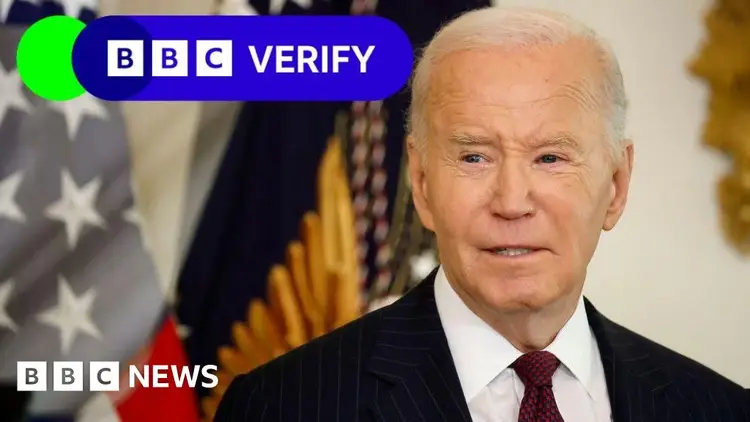What has Joe Biden said about pardoning his son Hunter Biden?

Following Hunter Biden's conviction this past summer on federal felony charges related to gun possession and taxes, the White House has maintained that President Joe Biden has no plans to grant his son a pardon.
On Sunday, the president granted a notable and contentious pardon, claiming that his son had faced relentless criticism from his political opponents.
Republicans have swiftly criticized the decision, pointing out Biden's earlier promises not to get involved in Hunter's situation. This action has also reignited discussions about presidential pardons and the autonomy of the justice system in the United States.
President-elect Donald Trump referred to the intervention as an "abuse," while James Comer, the chair of the House Oversight Committee, claimed that President Biden was trying to "evade responsibility."
Has Biden Ruled Out A Pardon?
Hunter Biden admitted guilt in two different court cases over the summer. One case involved federal tax violations, while the other was related to providing false information about his drug use on a form when purchasing a handgun.
Following his conviction, the White House quickly announced that he should not anticipate receiving a presidential pardon from his father.
During a June interview with ABC, when questioned about whether he had dismissed the idea of granting a pardon to his son, Biden responded, "Yes."
During a G7 summit in June, Biden informed reporters, "I stated that I would respect the jury's verdict, and I intend to follow through on that. I will not grant him a pardon."
Just a couple of days after Donald Trump secured his comeback to the White House on November 7, officials in the Biden administration were adamant that the president had no plans to grant a pardon to his son.
During a news conference, when someone inquired whether President Biden might be inclined to assist Hunter, White House Press Secretary Karine Jean-Pierre responded, "We've received that question several times, and our answer remains the same: no."
In June, Biden expressed his contentment with the fairness of his son's trial. However, in his remarks on Sunday, he described Hunter's situation as a case of "miscarriage of justice."
Has Biden’s Move Happened Before?
It's not uncommon for presidential pardons to happen, and there are instances of past presidents granting pardons to their relatives.
In January 2001, shortly before stepping down from the presidency, Bill Clinton granted clemency to his half-brother, who had been convicted of drug distribution offenses from 1985.
In December 2020, Donald Trump granted a pardon to Charles Kushner, who is the father of his son-in-law, Jared Kushner. This pardon was related to charges of lying during an investigation, manipulating witnesses, and avoiding tax payments.
During the weekend, the president-elect chose Charles Kushner as his candidate for the position of US ambassador to France, a decision that has attracted some attention in Paris.
Charles Kushner, seen here with his son Jared, is one of the individuals who received a pardon from President Donald Trump.
However, Hunter Biden's pardon is unique compared to past cases for a few reasons, especially since a president has never granted a pardon to his own child before.
The duration of the pardon issued by President Biden has come under some criticism. It encompasses any offenses committed by Hunter Biden during a nearly 11-year span, specifically from January 1, 2014, to December 1, 2024.
Jeffrey Crouch, an assistant professor of political science at American University, mentioned to the BBC that it's quite rare for a presidential pardon to encompass such an extensive period.
Another notable point is that Hunter Biden has not been sentenced yet and is scheduled to go to court later this month. The US Justice Department has stated that it's "highly unusual" for a president to grant a pardon to someone before they have been sentenced for a federal crime.
Jeffrey Crouch informed the BBC that authorities typically suggest a five-year delay before seeking a pardon.
This kind of action isn't entirely new. A notable instance occurred in 2017 when Donald Trump granted a pardon to former Arizona sheriff Joe Arpaio, who had been found guilty of criminal contempt, even before he received his sentence.
Biden's Take On Trump's Past Pardons
Biden has been vocal in criticizing several pardons that were granted by his predecessor during the latter's initial term in office.
In 2019, Biden criticized Trump for granting pardons to two U.S. Army officers. One of these officers had already been found guilty, while the other was about to face trial for committing war crimes in Afghanistan.
Biden stated that the former president had violated "the principles of justice, the ideals that set our nation apart, and the honorable service of those who wear the uniform."
In 2020, after Trump reduced the prison term of his longtime adviser Roger Stone, Biden referred to him as “the most corrupt president in modern American history.”
In a wider context, throughout his campaign in 2020, Biden pointed out that Trump was weakening the role of the attorney general and turning it into a political tool.
"The attorney general doesn’t serve as the president's lawyer; they are, in fact, the lawyer for the people,” Biden stated. “We have never witnessed such a misuse of that position as we do currently."



























































